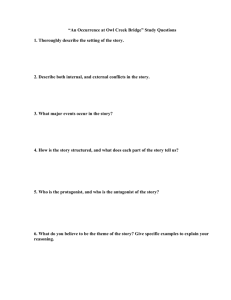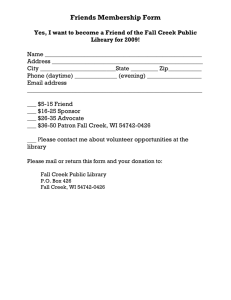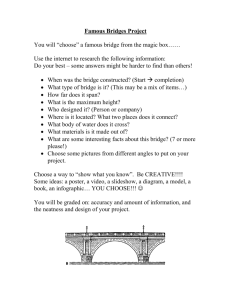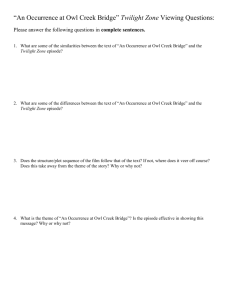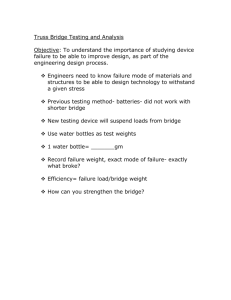Root River Map - Root River Outfitters
advertisement
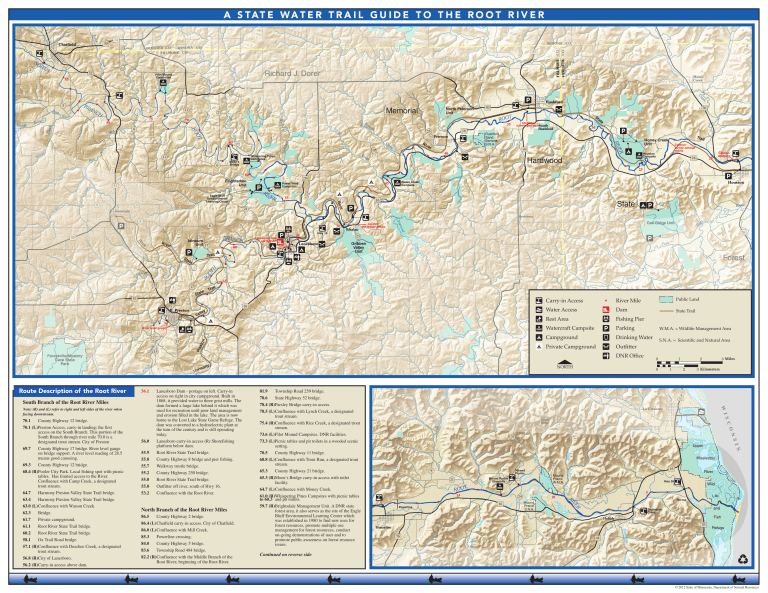
A S TAT E WA T E R T R A I L G U I D E T O T H E R O O T R I V E R c Lyn 74 30 CO.. CO. N NO WINONA O. C CO. CO. ONA O WINONA W WINO MSTED CO. OLM O. CO. FILLMORE C t Trou 43 Cre NO ek RT H 52 85 ek Cre Pilot Mound Campsites ey Mon 2 FILLMORE CO. CO. HOUSTON CO. h Chatfield Richard R d J. Dorer e Mo ne y Money Creek 30 Crreek OT on Torke ls 40 Cr ee k Hardwood ER 43 Tra il Money Creek Unit RIV k r e 30 Rushford Sand Barrens S.N.A. ve e re 105 Moen’s Bridge 6 Ri at Rushford 16 25 Peterson Whispering Pines Campsites 11 e Ric gs St caution: submerged damSouth 35 C y ad Sh T ROO rin Ra ae n 65 76 Cre ek 6 ek Cre Sp RO Creek 70 30 North Peterson Unit Memorial k 75 80 21 ek Cre Middle 11 CH River h nc Bra Rushford Big AN Roo t ee Cr BR 5 Caution: former railroad debris Houston Campsite 16 Caution: dredging 20 le da rn Fe 25 60 250 Brightsdale Unit Cr ee k 52 ER 11 21 Fountain 16 State Riveerr t r ga Su 55 Roo 8 25 RIV Eagle Bluff Environmental Learning Center Houston Raaen Creek Campsite 45 Power Plant Campsites B Bratsburg H Isinours Unit 17 Riv er Lanesboro Dam portage left Whalan Hwy 16 Lanesboro 60 Trail St Gribben Valley Unit Forest UT H n bbe SO i Tra Cre ek Crreek te Sta South 43 65 l 17 16 16 ey ll Va Du sch ee Preston Fork Gri Creek 52 76 23 ate W Watson 70 River level gauge sto Township Road 259 bridge. 78.6 State Highway 52 bridge. Lanesboro carry-in access (R) Shorefishing platform below dam. 73.3 (L)Picnic tables and pit toilets in a wooded scenic setting. 53.2 Confluence with the Root River. 84.0 County Highway 5 bridge. 83.6 Township Road 484 bridge. Continued on reverse side River Hwy 26 Wild 24 16 Powerline 5 21 10 Mound Prairie S.N.A. Life Norma and Thompson Creek Fish Cr eek Hokah Houston 76 26 44 Refuge Creek r 82.2 (R)Confluence with the Middle Branch of the Root River; beginning of the Root River. 3 Kilometers ield 56.2 (R)Carry-in access above dam. Powerline crossing. 15 61.0 (R)Whispering Pines Campsites with picnic tables to 60.3 and pit toilets. Mound Prairie W.M.A. Butterf 56.8 (R)City of Lanesboro. 85.3 Mound Prairie Campsite R 57.1 (R)Confluence with Duschee Creek, a designated trout stream. 86.0 (L) Confluence with Mill Creek. 2 3 Miles VE Ox Trail Road bridge. County Highway 2 bridge. 86.4 (L) Chatfield carry-in access. City of Chatfield. T ROO 64.7 (L) Confluence with Money Creek. 59.7 (R)Brightsdale Management Unit. A DNR state forest area, it also serves as the site of the Eagle Bluff Environmental Learning Center which was established in 1980 to find new uses for forest resources, promote multiple use management for forest resources, conduct on-going demonstrations of uses and to promote public awareness on forest resource issues. 1 2 16 RI 58.1 86.5 21 C ystal Cr 64.7 1 Mississippi Creek Outfitter off river, south of Hwy 16. North Branch of the Root River Miles 0 Valley Root River State Trail bridge. 55.0 Harmony Preston Valley State Trail bridge. 0 Brush 55.0 65.3 (R)Moen’s Bridge carry-in access with toilet facility. Mound Prairie 9 County Highway 21 bridge. eek Cr 65.3 S.N.A. = Scientific and Natural Area k County Highway 250 bridge. ee Cr Walkway trestle bridge. 55.2 Root River State Trail bridge. Outfitter Upper County Highway 11 bridge. 55.7 60.2 Private Campground y Da County Highway 12 bridge. Root River State Trail bridge. Drinking Water 25 rer 70.5 61.1 Campground W.M.A. = Wildlife Management Area South Ridge 73.6 (L) Pilot Mound Campsites. DNR facilities. County Highway 8 bridge and pier fishing. Private campground. Parking La Crescent L s 75.4 (R)Confluence with Rice Creek, a designated trout stream. Root River State Trail bridge. 61.7 Watercraft Campsite 14 78.5 (L) Confluence with Lynch Creek, a designated trout stream. 55.8 Bridge. Fishing Pier 78.4 (R)Parsley Bridge carry-in access. 55.9 62.3 Rest Area Creek re 81.9 County Highway 17 bridge. River level gauge on bridge support. A river level reading of 28.5 means good canoeing. 63.0 (L) Confluence with Watson Creek. State Trail I N N S C O I S 56.0 Lanesboro Dam - portage on left. Carry-in access on right in city campground. Built in 1868, it provided water to three grist mills. The dam formed a large lake behind it which was used for recreation until poor land management and erosion filled in the lake. The area is now home to the Lost Lake State Game Refuge. The dam was converted to a hydroelectric plant at the turn of the century and is still operating today. 68.4 (R)Pooler City Park. Local fishing spot with picnic tables. Has limited access to the River. Confluence with Camp Creek, a designated trout stream. 63.4 Dam W County Highway 12 bridge. Harmony Preston Valley State Trail bridge. Water Access NORTH 68.8 (L) Confluence with Trout Run, a designated trout stream. 69.3 Public Land Sto 69.7 River Mile y on rm Ha Silv er 56.1 Note: (R) and (L) refer to right and left sides of the river when facing downstream. 70.1 (L)Preston Access, carry-in landing; the first access on the South Branch. This portion of the South Branch through river mile 70.0 is a designated trout stream. City of Preston Carry-in Access DNR Office South Branch of the Root River Miles 70.1 12 Pre k Cr ee Route Description of the Root River 15 W ill ow Forestville/ Forestville/Mystery s //Myste My ry Cave Cave State S Park k n 12 17 ot Ro Oak k Ridge Ridge Unitt Ridg ek Cre t oo R BRANC 55 caution: old bridge debris nd 80 50 mo 8 Dia 8 © 2012 State of Minnesota, Department of Natural Resources R E V I R T O RO A STATE ATER W E T A A ST AIL Guide TR WATER TRAIL GUIDE TO THE ROOT RIVER “The Root River maintains a timelessness as it represents some of the finest scenic and historic qualities which characterize southeastern Minnesota.” Minnesota State Parks and Trails www.mndnr.gov/watertrails Cambridge 169 ssi ssi pp i er Riv Minneapolis St. Paul St. Croix 94 8 River Mi The Root River 35 Rum Ri ve r River Wabasha 52 er Ca nn on 35 W I S C O N S I N Riv Faribault 61 63 14 14 o umbr Rochester Z 35 90 t Roo 90 63 River 52 Caledonia The Minnesota Department of Natural Resources is an Equal Opportunity Employer. This information is available in alternative format upon request. Minnesota State Parks and Trails Regional Unit 1200 Warner Road St. Paul, MN 55106 651-772-7900 Online water trail information and maps can be found at www.mndnr.gov/water trails DNR Information Center The DNR’s Information Center is available to provide free publications of facilities and services as well as answers questions pertaining to DNR recreational opportunities in Minnesota. The DNR Information Center 500 Lafayette Road, St. Paul, MN 55155-4040 651-296-6157 (Metro Area) 1-888-MINNDNR (646-6367 MN Toll-Free) TTY: 651-296-5484 (Metro Area) TTY: 1-800-657-3929 (MN Toll-Free) www.mndnr.gov You can make a difference by joining the DNR Adopt-a-River Program. Be a clean up volunteer for a portion of your favorite recreation area. Call the DNR Information Center for a brochure, or visit www.mndnr.gov/adoptariver. All photos:, DNR © 2012 Minnesota Department of Natural Resources The Root River maintains a timelessness as it represents some of the finest scenic and historic qualities which characterize southeastern Minnesota. Formed of two branches in the west, the North and the Middle, the Root River winds past towering bluffs topped with oak and hickory. Joined above Whalan by the South Branch, a tributary which flows from Mystery Cave, the river continues its way past bluffs and outcrops until Rushford. There the river straightens as the valley broadens considerably. The scenery then settles into a gentle plain of pastureland and mixed cottonwood and maple with wooded rolling hills visible in the distance. The Root River has a gentle to moderate flow with some riffles at various stretches. From Chatfield to the Mississippi River the river falls 310 feet for an average drop of 3.4 feet per mile. River levels peak in mid-March and once again in early June. Water levels also vary substantially with rainfall. Though the watershed has many spring-fed, clear water tributaries, including the South Branch, the Root River is somewhat cloudy due to erosive soil types in the watershed. The Root River’s superlative scenery and characteristics make it suitable for many types of recreation. Family canoe day trips are very popular. Those more adventurous can take advantage of the canoe campsites for overnight trips. Several towns along the Root River also offer historic sites, services and hospitality to river users (see Towns along the River). Other pastime favorites along the river are bird watching, nature observation, bicycling along the Root River State Trail, and fishing (see River Life). River Life Wildlife - Natural life along the Root River is as diverse as anywhere in the state. Wooded shores harbor mammals such as white-tailed deer, gray fox, red fox, coyote, raccoon, woodchucks, squirrels, weasels, and badgers. River otter and a beaver can be found in the water. f Lizards such as the L skink, racerunner, s and a many species of snakes, including s the t timber rattlesnake, can be r found along the f banks and outcrops. b Fish - There are many species inhabiting the river including smallmouth bass, channel catfish, rock bass, sunfish, crappies, and rough fish. Most of these can be found in the active stretches or pooled areas of the river. Brown trout can be found in the clearer and colder spring-fed streams, as well as the South Branch. All anglers fishing in designated trout waters are required to have a current trout stamp. Boating Information Birds - These inhabitants constitute some of the more spectacular river life and can be seen in abundance. The Root River supports over 40 species of birds. While floating, it is quite common to see blue herons, egrets, and wood ducks moving about the river’s edge. One might also see wild turkey foraging on the shore or cliff swallows building vase-shaped mud nests on bridge overhead. Raptors- Whether perched high in a tree or soaring majestically above the valley, these magnificent birds of prey provide a visual bounty for those using the Root River. Towns Along the River Nestled among the natural setting, vestiges of culture, past and present, come together in the form of towns. The towns were linked by the Southern Minnesota Railroad, completed in 1870, which was used to carry milled products such as flour and lumber to markets throughout the Midwest. The railroad grade is now the Root River State Trail. These towns represent the development of the valley and offer the visitor a pleasing focus on rural and small town Minnesota as well as a taste of the past. • Register your watercraft. All watercraft more than 9 feet in length, including nonmotorized canoes and kayaks, must be registered in Minnesota or your state of residence. • Not all areas of this water trail are suitable for motor use. Rest Areas and Camping Sites • Rushford - Settled in 1854. It was a major railroad center and mill town. It offers a canoe launch, a motel, a picnic area, grocery stores, restaurants, and an outfitter. • Houston - Settled in 1852, it was a steamboat port and the center of railroad transportation. It offers a canoe launch, a motel, a campground, a picnic area, a grocery store and restaurants. • • • Public rest areas are available along the route to rest, picnic and explore. Camp only in designated campsites, which are available on a first-come, first-served basis Bring drinking water. Drinking river water is not recommended, but if you do it must be treated. Respect private property. Stop only at designated sites; most of the shoreland is private property. Be sanitary! Use designated toilet facilities or bury human waste away from the river. Hokah - Settled in 1851, it served as a mill site for railroad machine shops and was serviced by steamboats. It offers a park, grocery store, and restaurant. Planning A Safe River Trip Preston - Settled in 1853 along the South Branch, this community was active in milling. Today the town is the county seat of Fillmore County. It offers a canoe launch, picnic area, campground, lodging, grocery store, and restaurant and connection to the Harmony-Preston Valley Trail. A successful river trip is safe. To enjoy a safe journey, you should be prepared by doing the following: • Get acquainted with your route. Plan your trip with a map before you depart and advise someone of your plans including planned departure and arrival times. • Travel with a companion or group. Sustainable Ecosystems • Choose a distance that is comfortable for you, most people paddle two to three river miles per hour. • Wear a U. S. Coast Guard approved personal flotation device that state law requires be on board the boat for each person. Lanesboro-Platted in 1868 along the South Branch as a railroad town, it flourished as a transportation and mill center. Today Lanesboro offers a historic downtown district. It also offers a campground, a picnic area, a bed and breakfast, a motel, grocery stores, restaurants, and an outfitter. • Bring a first aid kit that includes waterproof matches. Outdoor recreation is dependent on a healthy and attractive natural environment. Sustainable outdoor recreation enables people to enjoy the outdoors without negative impacts on the environment. Communities working together can improve water resources by promoting environmentally sensitive land use practices along rivers and throughout watersheds. • Bring an extra paddle in your canoe. • Be cautious of river obstructions, such as overhanging and dead trees in the river. Chatfield - Settled in 1853 on the North Branch, it was a milling and transportation center. It offers a canoe launch, a picnic area, grocery stores, and restaurants and hotel. • You must pack out all trash. • Leave only footprints; take only photographs! Whalan - Platted in 1868 as a railroad town, it was once the tobacco center of Fillmore County. Water levels can speed you up or slow you down. You can get information about water levels from the regional DNR office, or check the DNR website, or the DNR Information Center. Remember that much of the shorelands are privately owned. Respect and protect the water and shorelands. Peterson - A railroad village founded in 1867, it was the former site of a mill. The Peterson Trout Farm, founded in 1871, is located a mile south of town (now operated by the Minnesota DNR). There is a canoe launch in town. Natural shoreline buffers improve water quality by filtering out pollutants and sediments. Healthy and diverse native shoreline plant communities are attractive and provide important shoreline habitat for birds and wildlife. Natural Shorelands 40% evaporation 10% runoff 50% infiltration Altered Shorelands 30% evaporation 55% runoff 15% infiltration Continued from reverse side 57.9(L) Confluence with Torkelson Creek, a designated trout stream. 56.5(R) Abandoned Root River Power & Light powerhouse. This structure was one of the first major hydroelectric projects in the Root River Valley. Completed in 1914, its construction was unusual in that it was powered by the dam at river mile 62.0. The water was directed through the bluff behind the power plant via a tunnel. The diversion was necessary to increase the flow gradient enabling the water to reach sufficient force to power the generators. 56.1-56(L) Power Plant Campsites. DNR facilities with separate landings, picnic tables and pit toilets. 54.3 State Highway 250 bridge. 53.2 Root River State Trail bridge. 53.2(R) Confluence with South Branch of the Root River. 52.5(R) Highway 16 access. A DNR carry-in landing with pit toilet. 51.1(R) Private Campground. 50.1 County Highway 36 bridge. 50.1(L) City of Whalan. 49.9(R) Gribben Valley Management Unit. A DNR forest area. Outfitter located river left. 49.9 Old bridge abutments (debris). 49.4(R) Confluence with Gribben Creek, a designated trout stream. 49.3(L) City of Whalan carry-in access. Parking 500’ away. 47.5(L) Private Campground. 46.4(R) Confluence with Diamond Creek. 44.8(L) Confluence with Raaen Creek. 44.6(R) Raaen Creek Campsite. A DNR facility which offers two sites, picnic tables and a pit toilet in a wooded, river bottom setting. 42.6 Confluence with Big Springs Creek, a designated trout stream. 42.0 Township road bridge. 39.0 Outfitter off river. 38.9(R) Peterson carry-in access and toilet facility. 38.9 County Highway 25 bridge. 38.9(L) City of Peterson. 38.0(L) North Peterson Management Unit. A DNR forest area. 33.9 Submerged dam. Use caution when navigating over this structure. 33.8(L) Rushford carry-in access. 33.4 State Highway 16 bridge. 33.4(L) City of Rushford. 33.1(L) Confluence with Rush Creek, a designated trout stream. 32.3 Outfitter off river. 29.7(R) Confluence with Ferndale Creek. 27.9(L) Money Creek Management Unit, a DNR forest area. 26.1(R) Confluence with Daley Creek, a designated trout stream. 24.8(L) Houston Campsite, a DNR facility which offers two sites and picnic tables. 22.5 Abandoned railway bridge abutments (debris). 20.4(L) Confluence with Money Creek. 18.8 Dredging operation for sand removal. Use caution when navigating through the area. 18.6 State Highway 76 bridge. 18.6(R) City of Houston. 18.7(L) Houston carry-in access. 17.9 Powerline crossing. 17.3 Township road bridge. 17.0(R) Confluence with South Fork of the Root River. 14.8(L) Confluence with Buell Creek. 14.6(L) Confluence with Silver Creek, a designated trout stream. 13.9(L) Confluence with Storer Creek, a designated trout stream. 13.4(R) Confluence with Crystal Creek. 13.1(L) Mound Prairie Campsite, which offers two sites, picnic tables and a pit toilet in pastured woodland setting. 11.9 County Highway 24 bridge. 12.0(R) Mound Prairie carry-in access. 10.4(R) Confluence with Mound Prairie Creek. 10.1(L) Confluence with Day Creek. 9.5(L) Confluence with Brush Valley Creek. 6.6(R) City of Hokah. 5.8(R) Carry-in access. Confluence with Thompson Creek, a designated trout stream. 4.0 Abandoned Milwaukee Road Railway bridge. 3.2 (L) Hwy 26 carry-in access. County Highway 26 bridge. Milwaukee Road Railway bridge. 0.0 Confluence with Mississippi River. Next available downstream access on the Minnesota side is at Brownsville. The next available upstream access on the Minnesota side is at La Cresent.
